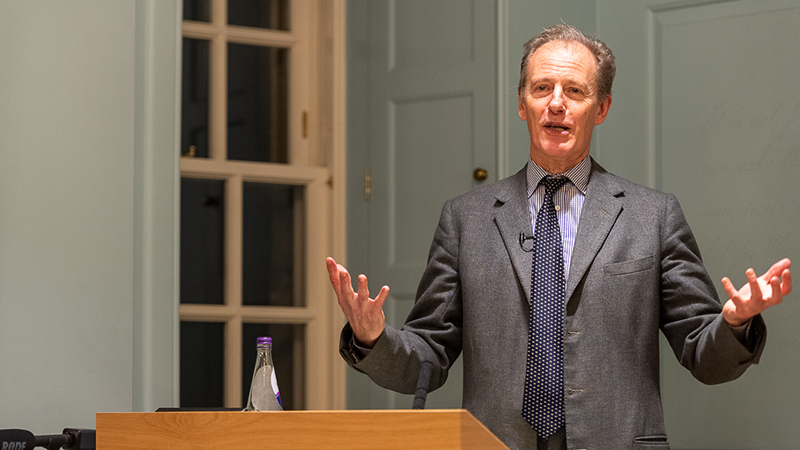Published:

In the inaugural Panmure House Inspirational Alba lecture, Andrew Gilmour, the former Assistant Secretary-General for Human Rights, and Head of the Office of the United Nations High Commissioner for Human Rights in New York, admitted to some pessimism about the deteriorating position on human rights in many countries, but argued that with goodwill, greater cooperation and the continuing work of the United Nations, it will be possible to restore human rights to the top of the international agenda.
The lecture at Adam Smith's Panmure House in Edinburgh, was arranged by Heriot-Watt University’s Edinburgh Business School, and Mr Gilmour was introduced by Richard A. Williams, the Principal and Vice-Chancellor of Heriot-Watt University.
Mr Gilmour cited the December 1948 Universal Declaration of Human Rights, adopted in Paris by the United Nations, as one of the greatest achievement in human history, and this ushered in a sustained period where the rights of humans across the world improved dramatically.
“We have had a reversal of the positive trajectory of human rights. When I began working in this field, the world was on the cusp of a revolution in the flowering of human rights which lasted 30 and perhaps 40 years.’’
“In many parts of the world, human rights advanced dramatically but all that came to a grinding halt a few years ago. There is no particular date and no particular cause, but if I had to identify the causes they were a mixture of the financial crisis and resentments which grew up over austerity and inequality.’’
He cited the global war on terrorism, which led to a counter-terrorism reaction where ‘sometimes far greater abuses of human rights are carried out than by the terrorists themselves’, and then the international surge of refugees and migrants.
“Somehow they were all bracketed in together as terrorists which led to a reaction against refugees and migrants.’’
This, along with the rise of China, with its extremely hostile position on human rights, and the growing assertiveness in Russia, plus the changing political position in the United States in the last three years.
“At the UN, we see a push back against human rights, which is demonstrated in many ways and forms, one of which is the prevention of human rights on the agenda of the Security Council,’’ he said.
The UN Security Council’s five members, China, the United States, Russia, France and United Kingdom, can veto any decision proposed by the other nations, which has been a major stumbling block on agreeing new protections on human rights.
In peace operations around the world, there were increasing acts of reprisals carried out against ‘courageous human rights defenders who have had the decency and courage to cooperate with the UN and provide us with information.’’
He said Scotland, as a small nation with its commitment to the rule of law and a track record in supporting the rights of the individual, can play an important part with a strong voice on the global stage.
“The current First Minister and the Scottish Government have made a series of very important statements on human rights and climate issues that are demonstrating leadership and commitment. Hopefully, we will see more of that.’’
He also said that the decision by the United Kingdom to leave the European Union had diminished the UK’s standing as nation which has global influence. He warned there could be a rush by the UK to do trade deals with unsuitable regimes.
He spoke of the growing politicisation of human rights and how many UN member states were ‘hypocritical’ about how they respond to human rights issues.
“It’s a truism that if you only care about human rights when your enemy commits them, then you don’t really care about human rights.’’
He said that the UK, France and United States are rightly very hard on the brutality on the Assad regime in Syria, backed by the Russians, but they are remarkable silent on the abuses carried out by the Saudis and the Emirates on the Yemen.
“Similarly, the Chinese and the Russians are happy to jump on the bandwagon when there is a Western issue but they are silent on Syria, North Korea, Myanmar, Burundi and many other places where they have allies they want to protect. Balancing that is the refusal of the Americans to criticise remotely Israel.’’
He said that in parts of Africa human rights was viewed as the ‘new colonialism’ and that when Western countries criticise the human rights of some African countries it is portrayed as the former rulers not getting over losing their empires.
He says this all adds up to an ‘interlocking crisis’ which is now tied up in the environmental crisis, and the rise of the populist totalitarian nationalism where minorities are being outcast and ostracised. While he admitted the picture appeared bleak, it was part of enlightened human endeavour, evoked in the works of Adam Smith and other Scottish Enlightenment scholars, to constantly seek paths towards improving levels of peace, diminishing conflict and securing human rights for all.